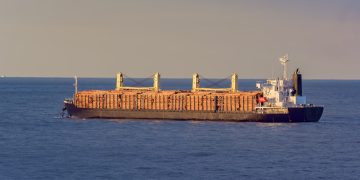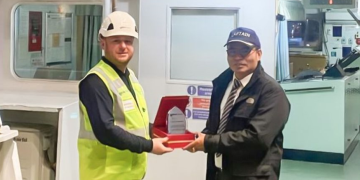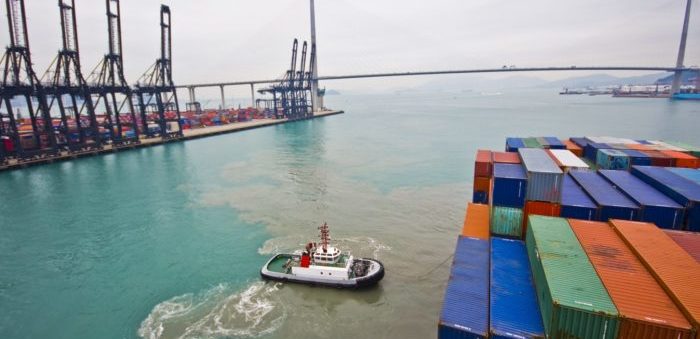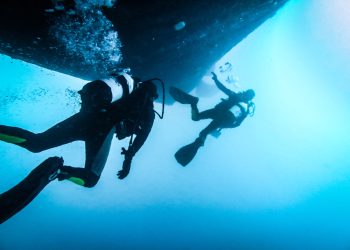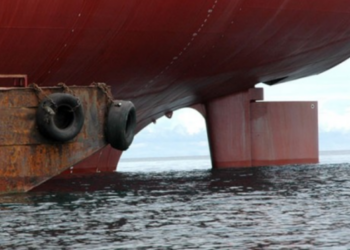Amanda Hastings, a trainee claims executive for LS3, the UK Club’s People Claims syndicate, explains why stowaways are a real and ongoing risk that can prove expensive for shipowners.
Amid the continuing migrant crisis in the Mediterranean and the media attention this story continues to receive, it is often easy to forget that the problem of stowaways is still a very real risk for shipowners. The UK Club has recently handled several concurrent cases, with a similar modus operandi, concerning stowaways from West Africa boarding ballasted ships bound for South America, Brazil in particular. The majority of these stowaways are “professionals”, who have perfected their art and are finding more creative ways in which to board ships.
Following this spate of new matters originating out of West Africa, the UK Club recently issued a Loss Prevention bulletin on stowaways hiding in rudder trunks on ballasted ships. In one instance, seven stowaways attempted to board the ship after having approached by speedboat. The Master and crew spotted the boat and managed to take preventative action to deter the stowaways before they successfully climbed the rudder. In another case, four stowaways were discovered well into the ship’s passage towards South America. The stowaways entered the ship via the rudder trunk, cutting through the protective grates in place. Other incidents have also been noted.
This article seeks to provide some general advice for shipowners on mitigating their risk, as well as providing some considerations for ships heading to Brazil, based on the UK Club’s recent experiences.
Preventative measures Shipowners can take and what to do when a stowaway is discovered
The UK Club has produced a
stowaway checklist which provides guidance on steps to take in preventing and dealing with stowaways. In addition to thorough stowaway searches in accordance with the ship’s ISPS Code compliant security plan and being vigilant whilst in port; additional precautions may need to be taken due to ship design.
Ships with a design that leaves the rudder trunk exposed should consider retrofitting bars across the rudder trunk. This will help deter stowaways from entering the ship, as it will block the access route. Additionally, for ships on ballast voyages, the rudder trunk should be checked several times when the ship is underway.
Worryingly, the UK Club has seen recent incidents in Nigeria of stowaways attempting to board whilst at sea; approaching the ship by speedboat. Given the risk of piracy in these waters, the Club strongly recommends additional watch-keeping whilst leaving Nigerian Ports. The use of an additional rating on the bridge, who can keep a look out for speed boats, will allow the ship to quickly take the appropriate evasive action.
When a stowaway is discovered, it is vital that their presence is made known to the owners, port agents and P&I Club. The stowaway and the area where he was discovered should be searched and findings noted/photographed. Stowaways should be questioned and a stowaway questionnaire filled out. The UK Club has access to a number of questionnaires, in various languages, which aid the process of verifying their nationality.
The Master should also produce a statement of the incident, confirming whether or not preventative procedures were followed. Some jurisdictions, such as Brazil, will require a sworn translation of this document in advance of the ship’s arrival. For country specific information the local agent and P&I Club’s correspondent should assist.
Legal obligations towards stowaways
Although there is currently no international regime dealing exclusively with stowaways , there are several international instruments that apply, inter-alia, to stowaways and their rights whilst on board a ship. These include the UN Declaration on Human Rights and the European Convention on Human Rights, 1950. Owners should take care to ensure that stowaways are not subject to degrading or inhumane treatment whilst on board, and should be provided with water, food, clothing, medical treatment (if required) and accommodation.
On the other hand, steps should be taken to ensure that the crew is not endangered and watch should be kept over the stowaway.
The IMO’s Convention on the Facilitation of Maritime Traffic 1965 (the FAL Convention) provides an indication as to the Shipowner’s obligations. Under 5.2 of Resolution FAL.11(37), the Shipowner’s reporting and financial obligations are set out as follows:
“1) to ensure that the existence of, and any relevant information on, the stowaway has been notified to the appropriate authorities at the port of embarkation, the next port of call and the flag State;
2) to comply with any removal directions made by the competent national authorities at the port of disembarkation; and
3) to cover any applicable costs relating to the removal, detention, care and disembarkation of the stowaway in accordance with the legislation of the States which may be involved.”
Ensuring the relevant documents and information are gathered is key to enabling the prompt disembarkation of any stowaway.
What are the costs of disembarking stowaways in Brazil?
Unlike many other countries, the Club has had success in disembarking stowaways in Brazil, but it comes at a price. It is not uncommon for a straight forward repatriation to cost in excess of US$30,000 per stowaway. This figure can quickly increase if the stowaway is detained for any particular length of time.
The following is a list of some of the common expense factors that add to the cost of repatriation of stowaways in Brazil:
- Immigration fines (variable)
- Private medical examination and mandatory malaria testing. A ship will not be granted a free practique by the Port Health Authorities if the stowaway is found to have malaria, and without this she will not be able to proceed to berth.
- Federal police escort (required for repatriation), this includes the escort’s expenses. The authorities will usually insist that a stowaway is repatriated using a federal police escort, these are not always immediately available. The Club has had an incident where repatriation was delayed by 43 days because of this.
- Cost of travel documents, including expenses for attendance by representatives of the relevant Embassy.
- Detention costs including accommodation, food and security costs whilst in Brazil. These will include a mandatory armed guard and can be excessive or inflated.
- Repatriation expenses for the stowaway including flights, pocket money and clothes.
- Some airlines require their own escort to accompany the stowaway, resulting in two escorts per stowaway. These costs would also be for the shipowner’s account.
Additional expenses will arise if the stowaway is found to have malaria or some other medical ailment, as medical costs will accumulate and the stowaway may need to stay in Brazil longer than normal to receive treatment. The local correspondent should always be involved at the outset to mitigate costs as far as possible.
The issue of stowaways is unlikely to go away and as ship security improves, stowaways will find more creative ways of boarding ships. If a stowaway is discovered once the ship has left West Africa, dependent on location, Owners may find it more cost effective to return to port and disembark the stowaway there, rather than risk higher costs in other jurisdictions, such as Brazil. For further advice, Owners should contact their P&I Club.
Source: The UK P&I Club









